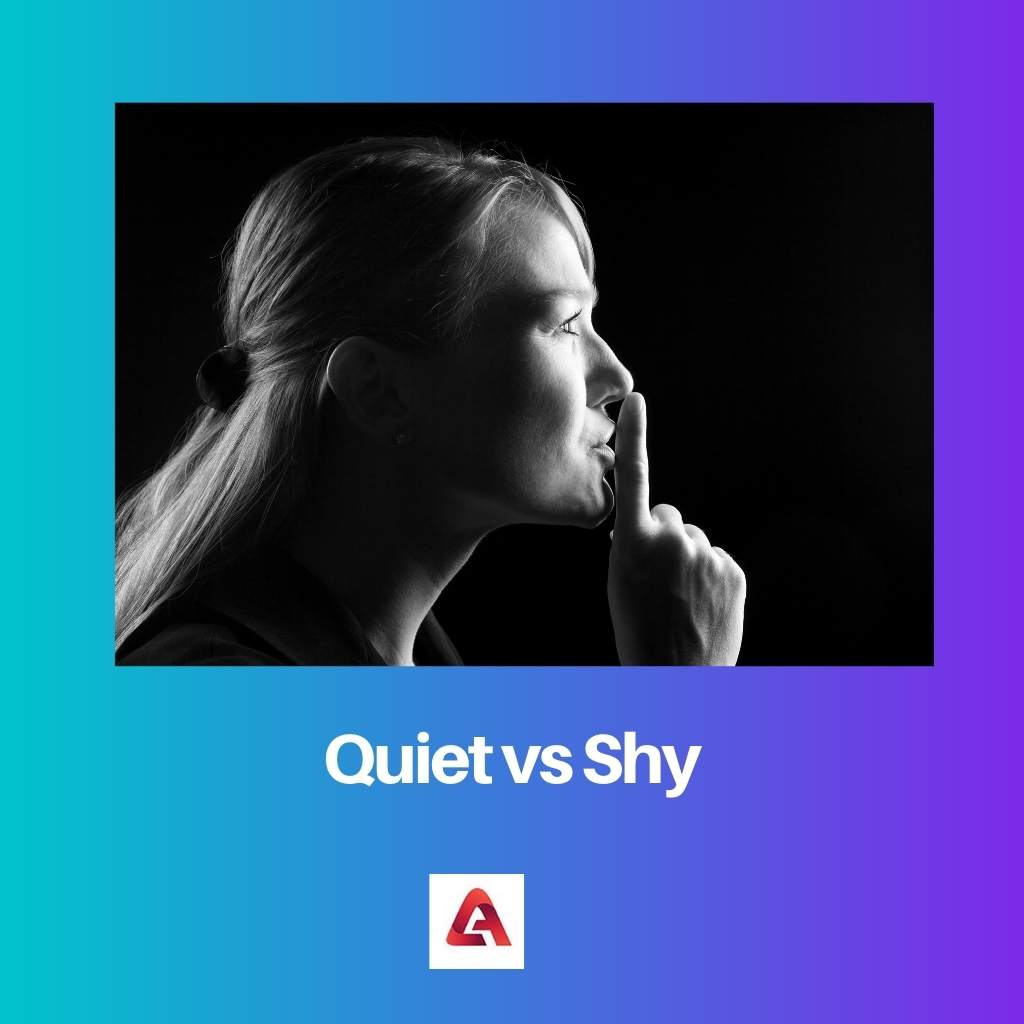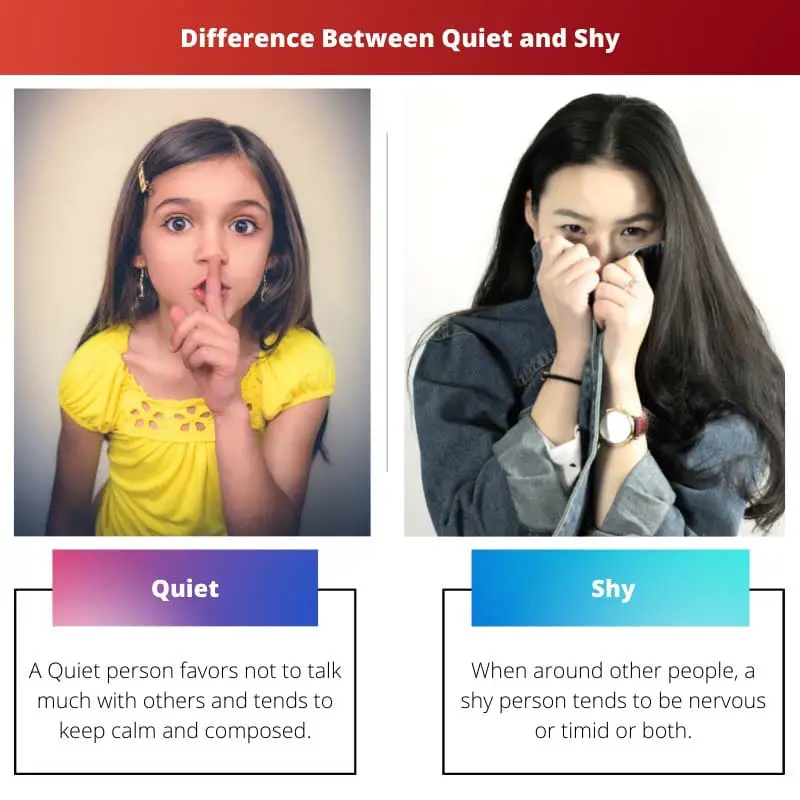The two terms, Quiet and Shy, are used synonymously sometimes, and at first glance, there may not seem to be a contrast between these two. People define quiet and shy as two words associated or correlated.
Key Takeaways
- “Quiet” refers to someone who speaks softly or makes little noise, while “shy” refers to someone hesitant or reserved in social situations.
- “Quiet” is a characteristic of a person’s behavior, while “shy” is a personality trait.
- A person can be quiet without being shy, but a shy person is quiet.
Quiet vs Shy
Quietness is a person’s tendency to speak softly, infrequently, or not at all. It can be a personality trait or a temporary state, and it doesn’t necessarily mean that the person is uncomfortable or anxious in social situations. Shyness is a feeling of discomfort, anxiety, or self-consciousness in social situations. Shy people may avoid social situations or struggle with initiating or maintaining conversations.

In summation, a quiet person is happy, favors being silent, and has no difficulty keeping their ideas, thoughts, or feelings to themself.
According to sources, Shy defines a person as being nervous or timid in the company of others. A shy person may experience uncomfortable or nervousness around other people, mainly if they are strangers. Shyness is a common phenomenon with unknown people or new situations.
Comparison Table
| Parameters of Comparison | Quiet | Shy |
|---|---|---|
| Behavior | A Quiet person favors not talking much with others and tends to keep calm and composed. | When around other people, a shy person tends to be nervous, timid, or both. |
| Nature of Behavior | They prefer to talk and interact less with other people. | They will feel anxious, nervous, and uncomfortable when around others. |
| Interactions with others | Will not face any problems while talking or expressing oneself to others. | They might blush or even stammer while talking to others. |
| During a Conversation | They tend to be comfortable being quiet and observant. | They might want to voice their opinions and thoughts but will still prefer to remain silent. |
| Stem cause | They find it comforting, and it is their choice to remain silent and quiet. | In most cases, the stem cause for being shy is being anxious, fearful of criticism, being judged, and receiving a negative response. |
What is Quiet?
A quiet person solely favors talking less.
Quiet people tend to be silent and very keen observers. According to various reports, peaceful people have more recollection and retaining capacity than talkative people.
A professional and specific term for people like this is ‘introvert.’ Another more random word is ‘loner,’ used for a quiet person who fancies being alone. Further, the term ‘reserved’ can be utilized in the case of a person who does not show their emotions or converse much.
A quiet person does not face any problem conversing and meeting other people when the situation demands. Some peaceful people, nonetheless, prefer being around others but choose not to speak much, and they do not feel uncomfortable, embarrassed, or anxious around people.
Quite people may be introverted but can also be outgoing. It is just that they prefer speaking less and like keeping their opinion and thoughts to themselves.

What is Shy?
Shyness is a regular occurrence with unknown people or new situations. A timid person may even stammer while talking to other people.
The term ‘shyness’ has an element of apprehension, nervousness, fearfulness, uncomfortableness, and anxiety; it is only referred to as animate objects, like people.
Shyness is regarded among people with low self-esteem as it is their ego-driven concern about what others will think of them. This tends to make them shy.

Main Differences Between Quiet and Shy
- A quiet person finds it comforting, and it is their choice to remain silent and peaceful. Still, in most cases, one of the stem causes for a person to be shy is being anxious, fearful of criticism, being judged, and receiving a negative response.
- A quiet person tends to be comfortable, silent, and an excellent observer, whereas a shy person might want to voice their opinions and thoughts but will still prefer to remain silent.

- https://ila.onlinelibrary.wiley.com/doi/abs/10.1002/jaal.729
- http://psasir.upm.edu.my/id/eprint/58307/1/JSSH%20Vol.%2025%20%28S%29%20Apr.%202017%20%28View%20Full%20Journal%29.pdf#page=71

Thanks for providing such a clear and useful differentiation!
I couldn’t agree more.
This was indeed intriguing, the descriptors are precise and well-articulated.
I found it to be an excellent resource for such distinctions.
I find the explanation to be quite convincing and logically presented.
Indeed, the article was well-structured.
The article is informative and well structured, great job!
Absolutely, it really helps to clarify the differences.
I appreciated the references, it adds credibility to the information.
The comparison table was especially effective in highlighting the distinctions.
I learned a lot from this article, very well done.
I tend to agree, and it provided a clear understanding of the subject.
The content was presented in a manner that made the understanding of the two terms much easier.
Absolutely, I appreciate how it delved deeply into the contrasts.
I didn’t realize there was such a notable difference between the two terms, thanks for sharing.
Agreed, it’s quite enlightening.
Definitely, it broadened my perspective.
The comparison table was especially effective in highlighting the distinctions.
Absolutely, it was an excellent resource for understanding the differences.
I couldn’t agree more. It was well articulated.
The article was insightful and efficiently brought clarity to the distinctions.
The article offered a thorough insight into the subject, I really appreciate the depth of analysis.
I think it’s an incredibly valuable resource for understanding differences between the two terms.
I concur, it shed light on important distinctions.